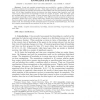139 search results - page 22 / 28 » Learning Initial Trust Among Interacting Agents |
ATAL
2006
Springer
13 years 11 months ago
2006
Springer
In many Multi-Agent Systems (MAS), agents (even if selfinterested) need to cooperate in order to maximize their own utilities. Most of the multi-agent learning algorithms focus on...
CORR
2002
Springer
13 years 7 months ago
2002
Springer
Sound and complete axiomatizations are provided for a number of different logics involving modalities for knowledge and time. These logics arise from different choices for various ...
SIGCSE
2010
ACM
14 years 2 months ago
2010
ACM
The “Hacker Curriculum” exists as a mostly undocumented set of principles and methods for learning about information security. Hacking, in our view, is defined by the ability...
PERCOM
2004
ACM
14 years 7 months ago
2004
ACM
Connectivity is central to pervasive computing environments. We seek to catalyze a world of rich and diverse connectivity through technologies that drastically simplify the task o...
CPAIOR
2009
Springer
14 years 2 months ago
2009
Springer
Abstract. In constraint programming there are often many choices regarding the propagation method to be used on the constraints of a problem. However, simple constraint solvers usu...

